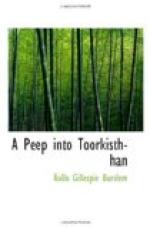Nothing of interest occurred either this day or the next, which brought us, after another dreary march of seventeen miles, to the fort and village of Koorrum. For nearly the whole distance between Rhoeh and Koorrum not a drop of water is procurable; as we had not provided against this contingency, we suffered in proportion. Altogether this part of the road offers considerable obstacles to the progress of an army, from its numerous ravines and steep though short ascents and descents, which would be very difficult for artillery; I should, from a cursory glance at the country, imagine that these steep pitches might be avoided by a more circuitous route, though the one we pursued was the beaten track for the caravans, and they generally find out the most convenient passage. The approach to Koorrum was pretty, but the scenery was of a character with which we were now so familiar that its peculiar beauties did not perhaps impress us as much as when they afforded the additional charm of novelty. A succession of walnut, apricot, mulberry, and apple trees shaded our path, which lay through extensive orchards, carpeted with beautiful turf. The vines clung to the sycamore trees; and where the spade had been at work, corn and artificial grasses grew in abundance. Our next halting place was Sarbagh, where we arrived on the 15th, after marching through a pleasant and fruitful valley, flanked by parallel belts of mountain land, the agreeable verdure relieving the eye from the barrenness of this, I may call it, parietal range. The ornamental trees which fringe the banks of the Koollum river, as it gracefully pursues its course to the Oxus, had altogether a very picturesque appearance.
The son of Baber Beg, the chief of Heibuk, was at this time residing at Sarbagh, and shewed us every possible attention, sending us sheep, fowls, corn, flour, fruit, and every article required for about seventy people. It was very gratifying to us to find that we were treated by the Uzbeg chiefs in so friendly a manner, as we had some misgivings lest our being unprovided with any letters from influential men in C[=a]bul, might create unfavourable surmises amongst a half-savage and naturally suspicious race. Doubtless we gained a large portion of attention and civility from the idea which pervaded all our hosts that we were great hakeems, physicians, and if we chose, could relieve the human body from every illness whether real or imaginary—and I was glad to remark that the latter class of ailment was by far the most common. Still, some diseases were very prevalent, particularly those which may be considered as induced by a total absence of cleanliness. Sore eyes were very common here, as in Affghanist[=a]n, and our powers and medicine chest were sometimes rather too severely taxed by importunate applicants, who never would apply the remedy in the manner described, unless it was administered upon principles which they understood, and which was in accordance with their own reasoning.




